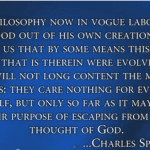[Originally published in 2015 as Dawkins Demonstrated to be Wrong….Again]
In 1989, Dr. Richard Dawkins wrote the following in a book review for the New York Times:
It is absolutely safe to say that if you meet somebody who claims not to believe in evolution, that person is ignorant, stupid or insane (or wicked, but I’d rather not consider that).
He has since added to that remark, writing:
By far the largest of the four categories is ‘ignorant’
Like much of what Dr. Dawkins writes, however, the actual evidence says something completely different.
Consider, for example, a new study that has been published in the journal American Sociological Review. The authors, Dr. Timothy O’Brien and Dr. Shiri Noy, examined people’s views on religion and science, correlating them with their actual knowledge of science. They found lots of interesting things, but I want to focus on just two of them.
First, they found that they could categorize the 2,901 people they examined into three broad groups: traditional, modern, and post-secular. The traditional group, which was composed of 43% of the people studied, preferred religion over science. The modern group (36% of those studied) preferred science over religion. The post-secular group (composed of the remaining 21%) viewed both science and religion favorably.
This, in and of itself, is interesting. Many people (like Dr. Dawkins) imagine (quite incorrectly) that there is a “war” between science and religion. It seems that the majority of people in the U.S. agree with this view. As a result, they think they are forced to choose one over the other. However, a minority (21%) have the more reasonable view – that science and religion are both excellent endeavors, and together, they give us a broad understanding of the world around us.
The second thing this research uncovered is much more interesting. It found that basic views on the Big Bang and evolution did not trend as someone like Dr. Dawkins would predict. For example, given the three groups of people listed above, which do you think would be least likely to believe in evolution and the Big Bang? The traditionalists, right? After all, the traditionalists prefer religion over science. Thus, they should be the most likely to reject “scientific” explanations for origins.
Actually, the post-secular people were the least likely to believe in both! While 21% of the people in the traditional group agreed that “the universe began with a huge explosion,” only 6% of the post-secular people did! The majority of the modern group (68%) agreed with the statement. Similarly, 88% of the modern group agreed that “human beings developed from earlier species of animals,” while only 33% of the traditional group did. However, a mere 3% of the post-secular group agreed with the statement!
Now here’s the really interesting part. The study used some scientific questions in an attempt to measure the scientific literacy of the people in each group. These true/false questions were very basic, such as, “All radioactivity is man-made” (false) and “Electrons are smaller than atoms” (true). Nevertheless, they found that there was no discernible difference between the scientific literacy of the modern group and the post-secular group. For some questions, a slightly larger percentage of the modern group got the correct answer, but for other questions, a slightly higher percentage of the post-secular group got the correct answer. Not surprisingly, the traditional group had the lowest percentage of correct answers.
This, of course, flies in the face of what Dr. Dawkins claims. In fact, the people who have the strongest opposition to evolution are not those who are ignorant of science. Instead, they know science just as well as those who strongly support evolution. They have just come to a different conclusion.
An article at Live Science reports on the conclusions of the study’s lead author:
The findings suggest that simply educating the public is unlikely to drive greater acceptance of these theories [the Big Bang and evolution], O’Brien said.
“The difference between the post-secular and the modern group is not a matter of a knowledge deficit,” O’Brien said. The post-secular people “understand genetics and experimental methods and statistics,” he said.
This is not surprising to me at all. The people I know who are most educated about science tend to reject evolution. Now, of course, the people I know are not representative of the nation as a whole. Nevertheless, this study shows that there are a lot of others like them.







